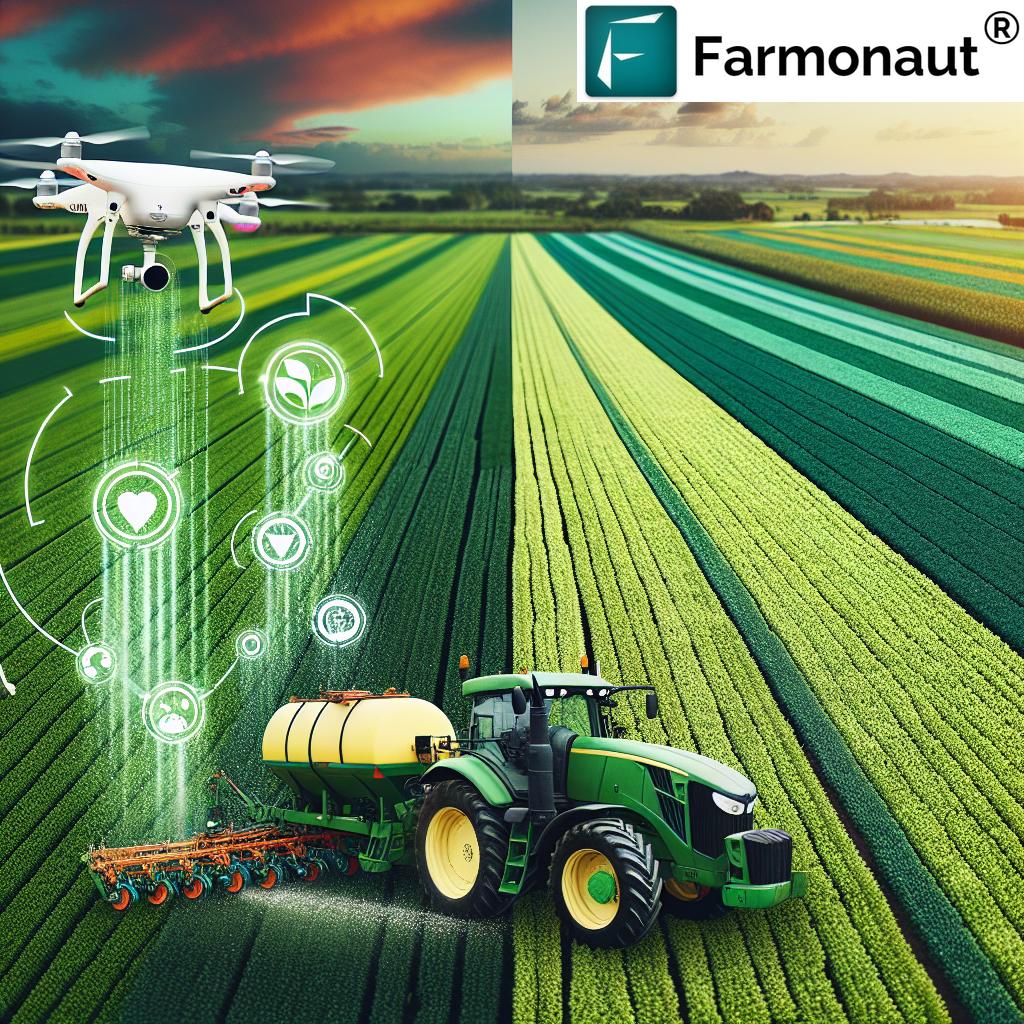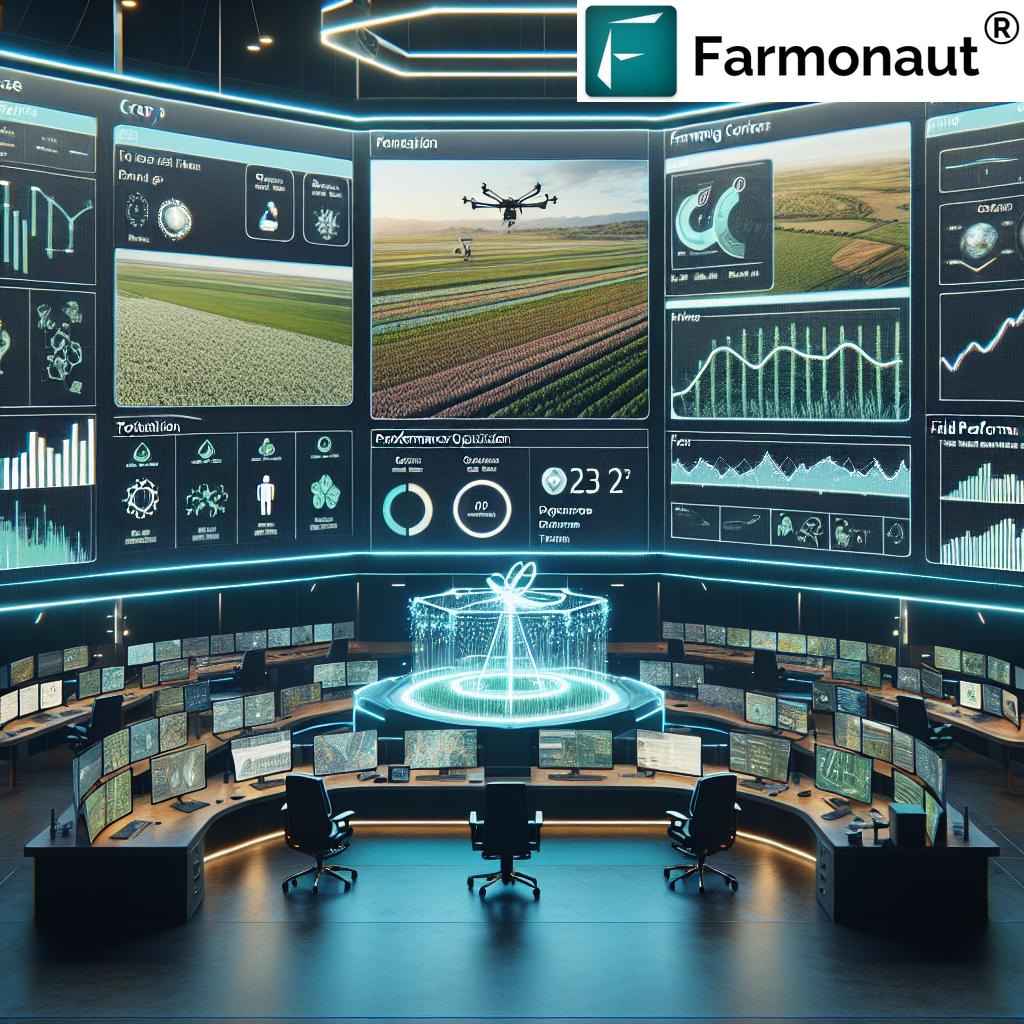Revolutionize Your Farm: How Precision Agriculture Technologies Boost Crop Health and Optimize Inputs
“Precision agriculture technologies can increase crop yields by up to 30% while reducing water usage by 50%.”
In the ever-evolving landscape of modern agriculture, precision farming technologies have emerged as game-changers for growers and agronomists alike. At Farmonaut, we’re at the forefront of this agricultural revolution, offering cutting-edge solutions that empower farmers to make data-driven decisions and optimize their operations like never before.
In this comprehensive guide, we’ll explore how precision agriculture technologies and crop health monitoring are transforming farming practices across the United States and beyond. From variable rate application to aerial imagery analysis, we’ll delve into the tools and techniques that are boosting crop yields, reducing costs, and ensuring optimal plant health.
The Foundation of Precision Agriculture
Precision agriculture is built on the principle of using data and technology to make more informed decisions about crop management. By leveraging advanced tools and techniques, farmers can:
- Optimize resource use
- Improve crop health and yields
- Reduce environmental impact
- Increase profitability
Let’s explore some of the key technologies driving this agricultural revolution.
Satellite-Based Crop Health Monitoring
At the heart of precision agriculture lies the ability to monitor crop health remotely. Satellite-based systems, like those offered by Farmonaut, provide farmers with unprecedented insights into their fields’ performance.
Our satellite technology captures multispectral imagery of your fields, allowing us to calculate critical vegetation indices such as NDVI (Normalized Difference Vegetation Index). These indices give us valuable information about:
- Crop health and vigor
- Stress levels
- Nutrient deficiencies
- Pest and disease outbreaks
By regularly monitoring these indices, we can detect problems early and take corrective action before they impact your yield.

Variable Rate Application: Precision in Action
One of the most powerful applications of precision agriculture is variable rate technology (VRT). This approach allows farmers to apply inputs such as fertilizers, pesticides, and water at varying rates across a field, based on the specific needs of each area.
By using data from satellite imagery, soil samples, and yield maps, we can create precise application maps that guide your equipment. This targeted approach offers several benefits:
- Reduced input costs
- Improved crop health and yield
- Minimized environmental impact
- Enhanced resource efficiency
With Farmonaut’s advanced analytics, we help you generate these prescriptions automatically, taking the guesswork out of input application.
Aerial Imagery: A Bird’s-Eye View of Your Fields
While satellite imagery provides broad coverage, aerial imagery captured by drones offers an even more detailed look at your crops. Drone flights for agriculture have become an invaluable tool for:
- High-resolution field mapping
- Crop damage assessment
- Plant stand counts
- Irrigation system inspection
Our platform integrates seamlessly with drone data, allowing you to combine these high-resolution insights with our satellite-based monitoring for a complete picture of your farm’s health.
Agricultural Data Analysis: Turning Information into Action
The true power of precision agriculture lies in its ability to transform vast amounts of data into actionable insights. At Farmonaut, we’ve developed sophisticated algorithms and machine learning models that analyze:
- Historical yield data
- Weather patterns
- Soil characteristics
- Crop health indicators
This comprehensive analysis enables us to provide you with personalized recommendations for optimizing your farming practices.
“Smart farming solutions have been shown to decrease fertilizer and pesticide use by 20-40% in various crop types.”
Field Performance Optimization: Maximizing Your Yield Potential
By leveraging the power of agricultural insights and analytics, we help you optimize every aspect of your field’s performance. Our platform provides:
- Yield prediction models
- Crop stress alerts
- Growth stage tracking
- Resource allocation recommendations
These tools empower you to make proactive decisions that boost your yields and reduce waste.

Innovative Crop Protection Strategies
Protecting your crops from pests and diseases is crucial for maintaining high yields. Our precision agriculture technologies offer advanced crop protection strategies, including:
- Early detection of pest infestations
- Disease risk modeling
- Targeted treatment recommendations
- Resistance management tools
By combining satellite data with on-the-ground observations, we help you implement integrated pest management practices that are both effective and environmentally friendly.
Fertility Management: Nurturing Your Crops from the Ground Up
Proper fertility management is the foundation of healthy crops and high yields. Our platform offers sophisticated tools for optimizing your soil nutrition, including:
- Soil nutrient mapping
- Fertilizer recommendation engines
- Organic matter tracking
- pH management
By tailoring your fertility program to the specific needs of each field zone, you can maximize nutrient uptake efficiency and reduce fertilizer costs.
Farm Boundary Mapping: Defining Your Digital Fields
Accurate farm boundary mapping is essential for implementing precision agriculture technologies effectively. Our platform offers:
- Satellite-based field delineation
- GPS-guided boundary creation
- Historical field boundary imports
- Automatic acreage calculations
By clearly defining your field boundaries, you ensure that all your precision agriculture efforts are focused exactly where they need to be.
Digital Scouting: The Future of Field Monitoring
While traditional field scouting remains valuable, digital scouting tools are revolutionizing how we monitor crop health. Our app enables you to:
- Geo-tag observations
- Upload photos of crop issues
- Record pest and disease incidents
- Share findings with your team in real-time
This digital approach streamlines the scouting process and ensures that no detail is overlooked.
Ready to start your precision agriculture journey? Try our web app or download our mobile apps:
Crop Damage Assessment Tools: Quantifying and Mitigating Losses
When disaster strikes, whether it’s due to weather events, pests, or diseases, our crop damage assessment tools help you quantify the impact and plan your recovery. These tools include:
- Automated damage detection algorithms
- Yield loss estimation models
- Historical comparison analysis
- Insurance claim support documentation
By quickly assessing the extent of damage, you can make informed decisions about replanting, adjusting inputs, or filing insurance claims.
Agricultural Production Models: Predicting Your Harvest
Our advanced agricultural production models combine historical data, current field conditions, and weather forecasts to provide accurate yield predictions. These models help you:
- Plan harvesting operations
- Optimize storage and transportation logistics
- Make informed marketing decisions
- Set realistic production goals
By having a clear picture of your expected yields, you can better manage your resources and maximize your profitability.
Commodity Crop Management: Precision at Scale
For farmers managing large-scale commodity crops, our platform offers specialized tools to address the unique challenges of high-acreage operations. These include:
- Multi-field management dashboards
- Crop rotation planning tools
- Market trend integration
- Equipment efficiency tracking
By optimizing every aspect of your commodity crop production, we help you stay competitive in a global market.
Precision Agriculture Technologies Comparison
| Technology | Data Collection Method | Coverage Area | Frequency of Updates | Resolution | Cost-Effectiveness (1-5) |
|---|---|---|---|---|---|
| Farmonaut Satellite System | Satellite Imagery | 1000+ hectares | Daily | 3-5m | 5 |
| Drones | Aerial Photography | 100 hectares | Weekly | 1-2m | 3 |
| Ground Sensors | In-situ Measurements | 10-50 hectares | Continuous | Point-based | 2 |
| Traditional Field Scouting | Manual Observation | Variable | As needed | High detail, low coverage | 1 |
As you can see from this comparison, Farmonaut’s satellite-based system offers unparalleled coverage, frequent updates, and cost-effectiveness for large-scale crop health monitoring and input optimization.
Integrating Precision Agriculture into Your Farm
Adopting precision agriculture technologies may seem daunting, but with Farmonaut, the process is straightforward and user-friendly. Here’s how you can get started:
- Sign up for a Farmonaut account
- Map your field boundaries using our intuitive tools
- Connect your existing farm management software (if applicable)
- Start receiving satellite-based insights within days
- Gradually implement our recommendations and track your progress
Our team of agronomists and tech experts is always available to guide you through the process and help you make the most of our platform.
Ready to take your farming to the next level? Sign up for Farmonaut today!
The Future of Farming: Connectivity and Visualization
As precision agriculture continues to evolve, the future of farming lies in increased connectivity and advanced data visualization. At Farmonaut, we’re constantly innovating to bring you:
- IoT integration for real-time field sensors
- AI-powered decision support systems
- Virtual reality field tours
- Blockchain-based supply chain tracking
These technologies will further enhance your ability to make data-driven decisions and optimize your farming operations.
Conclusion: Embracing the Precision Agriculture Revolution
The adoption of precision agriculture technologies is no longer a luxury—it’s a necessity for farmers who want to stay competitive in today’s challenging agricultural landscape. By leveraging the power of satellite imagery, data analytics, and smart farming solutions, you can:
- Boost your crop health and yields
- Optimize your input use and reduce costs
- Minimize your environmental impact
- Make more informed decisions based on real-time data
At Farmonaut, we’re committed to making these powerful technologies accessible and affordable for farmers of all sizes. Our platform combines cutting-edge technology with user-friendly interfaces, ensuring that you can harness the full potential of precision agriculture without needing to be a tech expert.
Are you ready to revolutionize your farm and take your agricultural practices to the next level? Join Farmonaut today and discover how our precision agriculture technologies can transform your farming operations.
FAQs
Q: How often is the satellite imagery updated in Farmonaut’s system?
A: Our satellite imagery is updated daily, providing you with the most current information about your fields.
Q: Can Farmonaut’s technology be used for all types of crops?
A: Yes, our platform is designed to work with a wide range of crops, from grains and oilseeds to fruits and vegetables.
Q: How accurate are the yield predictions provided by Farmonaut?
A: Our yield predictions are highly accurate, typically within 5-10% of actual yields, thanks to our advanced algorithms and continuous data inputs.
Q: Is it difficult to integrate Farmonaut with my existing farm management software?
A: Not at all. We’ve designed our system to be compatible with most popular farm management software, and our team is always available to assist with integration.
Q: How can I access Farmonaut’s data when I’m in the field?
A: Our mobile apps for both Android and iOS allow you to access all of Farmonaut’s features and data right from your smartphone or tablet, even in areas with limited connectivity.
By embracing precision agriculture technologies, you’re not just improving your farm’s performance—you’re contributing to a more sustainable and efficient future for agriculture worldwide. Join us at Farmonaut, and let’s revolutionize farming together!
For developers interested in integrating our technology into their own solutions, check out our API and API Developer Docs.





